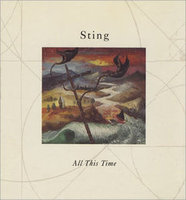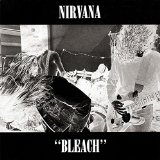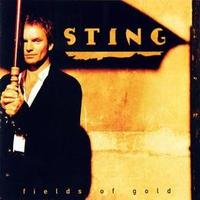91年発表の第3作アルバム The Soul Cages からの第1弾シングル。米5位を記録。
All This Time
(Sting)
D C D C
The river today
Saw a city in the fog
And an old church tower
Where the seagulls play
Saw the sad shire horses
Walking home in the sodium light
Two priests on the ferry
October geese on a cold winter’s night
川向こうを眺めた
霧に煙る町に
古い教会の塔
そこに飛び交うカモメ
ナトリウム灯に照らされ
家路をとぼとぼ歩く荷馬車馬
渡し船には二人の司祭
そして十月のガチョウが見えた寒い冬の夜
A C
The river flowed
D
Endlessly
G Em G D
To the sea
その川は流れていた
止めどなく
海へと
Our house tonight
One young, one old
To offer prayers for the dying
To serve the final rite
One to learn, one to teach
Which way the cold wind blows
Fussing and flapping in priestly black
Like a murder of crows
今夜家にやって来た
一人は若く、一人は年寄
死に行く者に祈りを捧げ
臨終の儀式を行う為に来た
どの向きに寒風が吹くのかを
一人が学び、一人が教える
カラスの群れの様に
司祭の黒装束をばたばたはためかせて
The river flowed
Endlessly
To the sea
その川は流れていた
止めどなく
海へと
Take a boat from the river
And I’d bury the old man
I’d bury him at sea
川から舟に乗り込み
その年老いた男を
海に葬ってやりたい
For they shall inherit the earth
Better to be poor
Than be a fat man in the eye of a needle
As these words were spoken I swear
I hear the old man laughing
What good is a used up world
And how could it be worth having?
大地を受け継ぐから
針の穴を通ろうとする太った男になるなら
貧しいままの方がいい
こんな言葉を聞かされると
その老いた男の高笑いが必ず聞こえるのだ
使い古しのこの世界の何がいいと言うんだ
どんな価値があるんだい
The river flowed
Endlessly
Like a silent tear
止めどなく
流れていた
音も無く頬を伝う涙の様に
The river flowed
Father, if Jesus exists
Then how come he never lived here?
その川は流れていた
神よ、イエスがいるなら
どうして彼はこの地に住まわなかったのか
G Em D C
Yeah, yeah
Yeah, yeah
Yeah, yeah
The Romans built this place
They built a wall and a temple in an edge of
the Empire garrison town
They lived and they died
They prayed to their gods
But the stone gods did not make a sound
And their empire crumbled
Till all that was left
Were the stones the workmen found
教師から教わった
帝国の要塞の街の端に
城壁や寺院を建てた
彼らは死ぬまでここに暮らし
神に祈りを捧げた
だけど石で出来た神からは梨のつぶて
やがて帝国は滅び
後に残ったのは
作業員が見つけた神という石だけだった
B D
The river flowed
E
In the falling light
A F#m A E
Of a northern sun
川は流れていた
北の陽が
降り注ぐ中
B D
Take a boat from the river
E D
Men go crazy in congregations
E D
They only get better one by one
川から舟に乗りたい
烏合の衆が
まともになるには一人でいるしかない
One by one, by one
One by one
一人で
きっちり考えないと
The river today
Saw a city in the fog
And an old church tower
Where the seagulls play…
川向こうを眺めると
霧に煙る町に
古い教会の塔が見え
そこにはカモメが飛び交っていた…
作者スティング自身と彼の他界した父親の二人を投影したと思しき語り手と老人が登場。
カラスに限らず死を象徴する鳥を、語り手はふと眺めた川の先に見止める。
此岸に向かう渡し船に乗った二人の司祭の目的地は他ならぬ自身の家だった…
the final rite[last rites] = 臨終の人が受ける儀式
死に行く者(the dying)の為の儀式であり、死んだ者(the dead)の為の葬式(funeral)とは異なる。
sting.com より本人の弁を抜粋
The priests say things like, ‘Blessed are the poor, their reward will be in Heaven’, and the father says, That’s crap, we want it now! I think my dad was like that. He did receive the Last Rites, but I think he died angry. And I was angry with him. I was angry at the whole fucking situation.
聖職者はこんな風に言う。「貧者は恵まれており、天国で報いられる」
それに対し父親が言う。「そんなのクソだ。今よこせ!」
思うに僕の父はこんな感じだった。臨終の儀式を受け入れはしたものの、彼は怒りながら死んで行ったのだろう。僕も彼に怒っていた。ひどい状況に対し怒っていた。
キリスト教(カトリック)に限らず日本人にも馴染のある清貧の美徳。それを説く聖職者に毒づく父親。無神論者と見える。
The song basically says, ‘Well, the Romans were here 2000 years ago and their religion was very important, but it went. Then Christianity happened and that seems to be inadequate now. Let’s look for bigger systems of continuity, like the river, this old religion.’ The song is a kind of black comedy. I’m not really anti-religious.
基本的にはこんな歌。「確かにローマ人は二千年前この地にいて彼らの宗教は大事だった。でもそれは消え去り、次にキリスト教が起こったけど今やそれが時代に即しているとは言い難い。もっと大きい連続性の系に目を向けよう。例えば川、この太古の宗教に」
この歌はブラックユーモアみたいなもので、僕はそんなに反宗教的じゃない。
対する息子スティング。反宗教的じゃないとは言え積極的に肯定するでもないので不可知論者とでも呼ぶべきか。
本作を black comedy と言うが、これは明るい曲調を思えば分かる気がする。
宗教を冷徹に見ているのは同じなのだろう、親子だもの。
そして自身の納得できる宗教を、神やキリストより前から存在する川に求めている。方丈記を引く迄も無く、川は無常や連続性の象徴であり、それは古今東西を問わない様だ。
ポリスの第3作のアルバム表題 Zenyatta Mondatta の由来になったケニア共和国建国の父のこの皮肉な言葉も思い出される。
When the Missionaries arrived, the Africans had the land and the Missionaries had the Bible. They taught how to pray with our eyes closed. When we opened them, they had the land and we had the Bible.
宣教師がアフリカにやって来たとき、我々アフリカ人は土地を持ち、彼らは聖書を持っていた。彼らは我々に目を閉じて祈ることを教えた。われわれが目を開いたとき、彼らは土地を持ち、われわれは聖書しか持っていなかった。
一国の支配統治と民衆の信心とが深く結び付いているのもこれまた古今東西の常。
本作の the stone gods は民衆の祈りに対して反応すらしなかった(did not make a sound)が、日本の神たる天皇は昨年、自ら発表した声明の中で天皇の葬儀の冗長さに言及。婉曲な言葉を選んではいたが、平たく言えば「大仰な儀式なんて税金と時間の無駄、ワシが死んだ時はちゃっちゃとやってくれ」という事だろう。わざわざ自身の権威を減ずる様な発言だったのだが、民衆の方からはなかなか進言できぬ、こんな実際的な提言をされちゃうと、逆にその神性と威信は大いに増す気がする。
They only get better one by one
一人一人でしか良くならない
多勢を頼む群烏がまともになるには党人根性を捨て我に返って一人で物事を冷静にきっちり考えなければならない、と言うのだろう。
大勢の会葬者に囲まれるより一人で海葬に付す方をこの語り手が望んでいる事とも繫がる。
カラスの群れ(a murder of crows)という語が別の所に登場するのは奇異な偶然だろうか。
この衆愚をまた宗教に絡めて考えれば、組織化された宗教団体(名の知れたものの殆どがそうだろう)への批判となろうか。そうだとするとそれは取りも直さずパンクが長らく大義と扱ってきたものなんだけど、スティングはやたらとパンク界隈から嫌われている。個人的には彼のプラグマティックな考えの方がよっぽど(本来的な)パンクで、あっちは権威主義的に見えるけど…




コメント